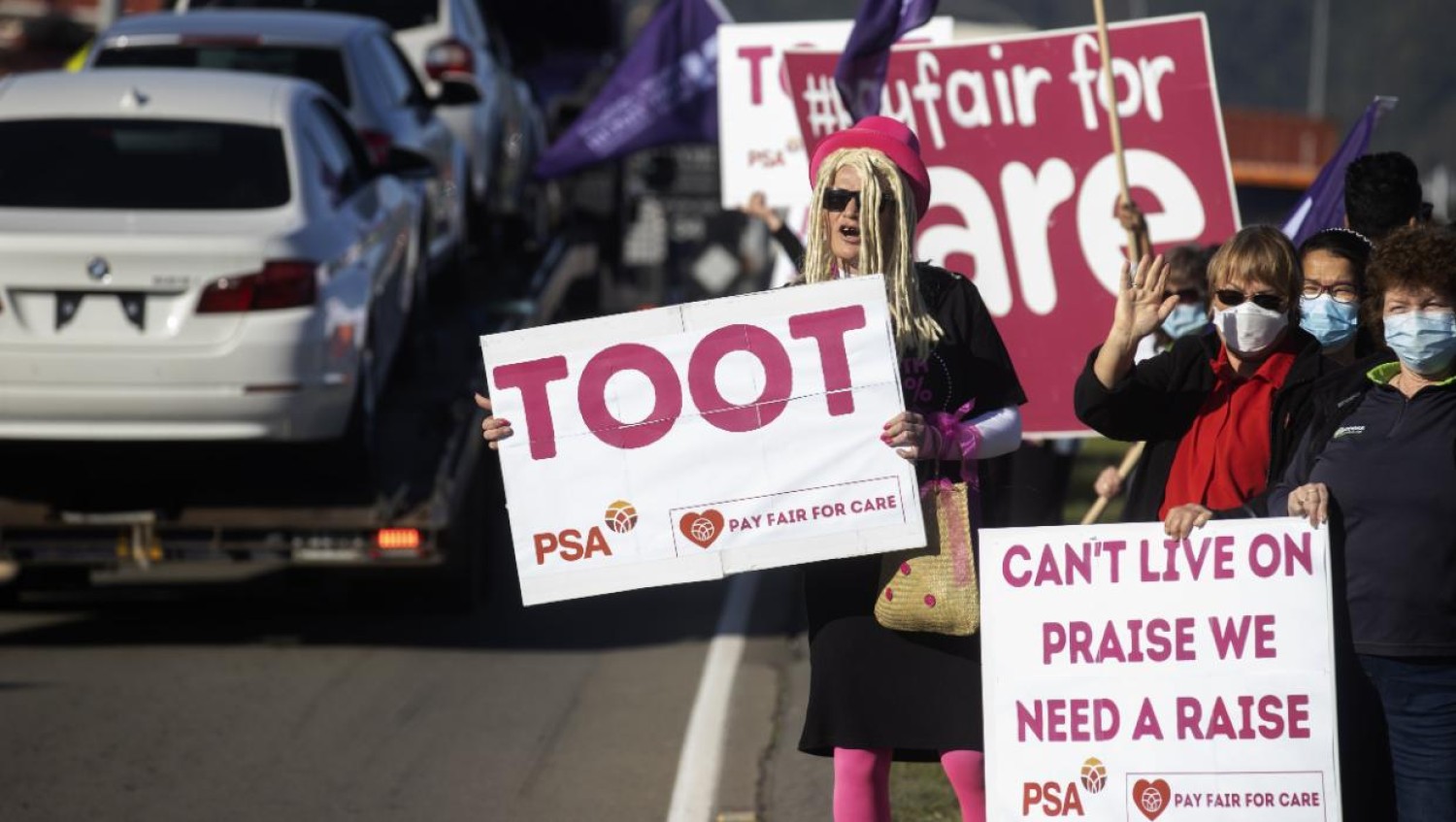Government’s failure on pay equity undervalues a crucial, caring workforce
Oct 18, 2023

Government’s failure on pay equity undervalues a crucial, caring workforce
Sally Pitts-Brown & Memo Musa
The Post
October 18, 2023
Sally Pitts-Brown is chief executive of Pathways, one of the largest community-based mental health and addiction providers in New Zealand. Memo Musa is chief executive of Platform Trust, the peak body for the mental health and addiction community sector.
OPINION: Is systemic discrimination stopping New Zealand’s 65,000 care and support workers from receiving the support and recognition they rightfully deserve?
Is this gender based, or is it because they are seen as unqualified and work for community organisations, not the government?
Mental health and wellbeing is paramount to the overall health of all New Zealanders. Almost half of all New Zealanders will experience mental distress or illness during their lifetime. Māori and youth disproportionally so.
Our mental health and addiction support workers care for and walk alongside the people they support. They provide daily care, like medication support and helping people to lead fulfilling lives in the community. Other times they play a crucial role in supporting those struggling with suicidal thoughts to find hope.
Without this workforce, thousands of New Zealanders experiencing mental health distress would be without support.
Once again, our care and support workforce (whose numbers mirror the population of Napier) have had their pay equity claim delayed by government officials. The same government officials who claimed to “take mental health seriously”.
Mental health and addiction support workers, peer workers, employment, housing, cultural and youth workers are all part of this undervalued and underpaid workforce. These are the exact same workers who were deemed essential through Covid.
Pay equity is about ensuring people in female-dominated professions are being paid the same as male-dominated professions where they are doing jobs of equal value, requiring the same level of skills, responsibilities and efforts. The same pay for the same work, regardless of gender.
Overwhelming evidence supports the fact that female dominated workforces are paid less than their male-dominated counterparts. Following an extensive process, we know that our predominantly female care and support workers are substantially underpaid compared to male comparator roles.
We want this imbalance addressed, our care and support workers paid fairly and to stop gender-based pay discrimination.
Over the last two years, across two different health ministers, Pathways (along with 14 other employers, four peak bodies and three unions) have been following a rigorous government process to achieve pay equity for care and support workers across our sector. Despite enormous effort, we have not been able to achieve any positive outcome.
Unlike most, pay rates for care and support workers are mandated in legislation. Due to inflation pressures and a rise in the cost of living, in real terms pay rates have now regressed back to minimum wage. In essence, our workforce has become the working poor, having only received a government-recommended 3% salary increase this year.
Ironically, this is not a workforce that will strike as they simply cannot afford a day without pay. Is it any surprise that prioritisation of wage increases has been for those workforces who can and do take industrial action?
Paying care and support workers what they deserve is urgent and overdue. The current legislation expires in December 2023.
This is not a secret from the outgoing and incoming government who right now are leaving 65,000 care and support workers hanging, with no security in sight in relation to their pay rates for 2024.
And yet every day we ask them to work and support some of our country’s most vulnerable people. How can we expect people to support others when they can hardly take care of themselves and their own families?
Delaying this settlement is nothing less than a cynical ploy by Te Whatu Ora, who are now questioning the pay equity process, which is outlined in the Equal Pay Act, overseen by the Public Service Commission and involves key milestones – which are required to be signed off at each stage of the process. It is deeply shameful.
We want our workforce to thrive so they can help the people we support to also grow and thrive. Without this workforce, many vulnerable New Zealanders will be left with little support.
We implore government to commit to address pay equity for care and support workers as a matter of urgency. This is an absolute priority. Not doing so is to simply to turn a blind eye and to perpetuate sex-based pay discrimination.
Our workers deserve certainty, hope and to be paid fairly for the work they do, regardless of who is in government. The people we support and their whānau deserve a valued and respected workforce.
 Click here to download more information »
Click here to download more information »
(432 KB, Adobe Acrobat PDF file)
Latest News
- Sep 3, 2025 HCHA Media Release 3rd September 2025: Home and Community Health welcomes improvements to Disability Support Services Read more »
- Aug 19, 2025 Registrations are open for the HCHA Member Only Forum: Whakatairanga : ELEVATE: Celebrate Our Impact – Enabling Care Closer to Home Read more »
- Jul 4, 2025 HCHA Media Release 4th July 2025: Home Support Sector Seeks Voice in Pay and Travel Solutions Read more »
- Jun 23, 2025 HCHA Meeting with Hon Casey Costello - Minister for Seniors and Associate Minister Health, 17th June 2025 Read more »
- Jun 12, 2025 HCHA Meeting with Hon Simeon Brown, Minister of Health, 10th June 2025 Read more »
Contact Us
Home & Community Health Association
PO Box 5344
Wellington 6140